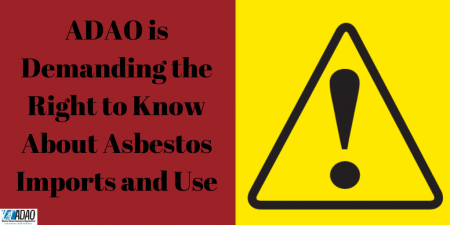Posted on October 31, 2018
The devil’s in the details, and you have a right to know about them.
When the industry holds sham conferences to promote asbestos products as “absolutely safe,” you have a right to know the facts as they are.
When a historic asbestos ban is achieved in Canada, formerly the world’s leading exporter of this carcinogen, you deserve to know that our work isn’t completely done: significant exemptions permitted by the legislation give the Chlor-Alkali industry 10 more years of use.
You have a right to know about asbestos use so that you are able to take effective steps towards protecting yourself against the harm it presents, and ADAO is not backing down from the fight to win that right.
Our Right to Know Petition, submitted to the Environmental Protection Agency (EPA) on September 25th, 2018, demands that EPA give Americans better information about the asbestos being brought into the U.S. and used in products we buy and are in our places of employment. We’re asking the EPA to use its authority under the Toxic Substances Control Act (TSCA) to require importers and users of asbestos and asbestos-containing products to report their activities and disclose these reports to the public. Remarkably, asbestos is currently exempt from TSCA reporting requirements.
For the Agency and the public, now is a critical time to require reporting. After years of inaction on asbestos, the recent amendments strengthening TSCA give EPA the tools to evaluate the risks of asbestos and take effective action to address them. Obama’s EPA used this new authority to select asbestos for one of the first comprehensive risk evaluations under the new law. Yet it’s become clear that EPA lacks complete and reliable information about who is importing asbestos in what quantities, where and how it is being used in the US, who is being exposed to it and how that exposure is occurring, etc. EPA is unable to do a good risk evaluation without this information and the only way to get it is to require reporting by industry. Once EPA has that information, it should be shared with the public.
A lot of folks agree. A slew of major stakeholders in the environmental and public health movement are joining us as co-petitioners for this proposal, including the American Public Health Association (APHA), Center for Environmental Health (CEH), Environmental Working Group (EWG), Environmental Health Strategy Center (EHSC), and Safer Chemicals Healthy Families (SCHF).
The impetus for this petition indeed began with questions about a major asbestos importer’s disclosure of its import activities to EPA. We contacted EPA to convey that this company, Occidental Chemical, had not filed any reports under their Chemical Data Reporting (CDR) rule. We were told that, while the EPA requires CDR reporting on many substances, asbestos is exempt: the asbestos industry has no obligation to report.
Our petition is intended to close this glaring loophole.
Recent research by ADAO revealed that asbestos imports to the U.S. soared by nearly 2,000 percent between July and August, an alarming reminder of the importance of requiring reporting on who is importing asbestos in what quantities and where it is going.
Asbestos is among the most dangerous minerals on the planet, with experts agreeing that there is no safe level of exposure. Recent research indicates that nearly 40,000 asbestos-related deaths occur in the U.S. each year. Yet importation and use of asbestos are legal in the U.S. with limited exceptions.
Our petition brings us one step closer to protecting ourselves from these dangers, and it is a vital one. When we know where this mineral is, who has it, and how it’s impacting people, we are armed with the tools we need to prevent exposure. We have a right to know.
Linda Reinstein
